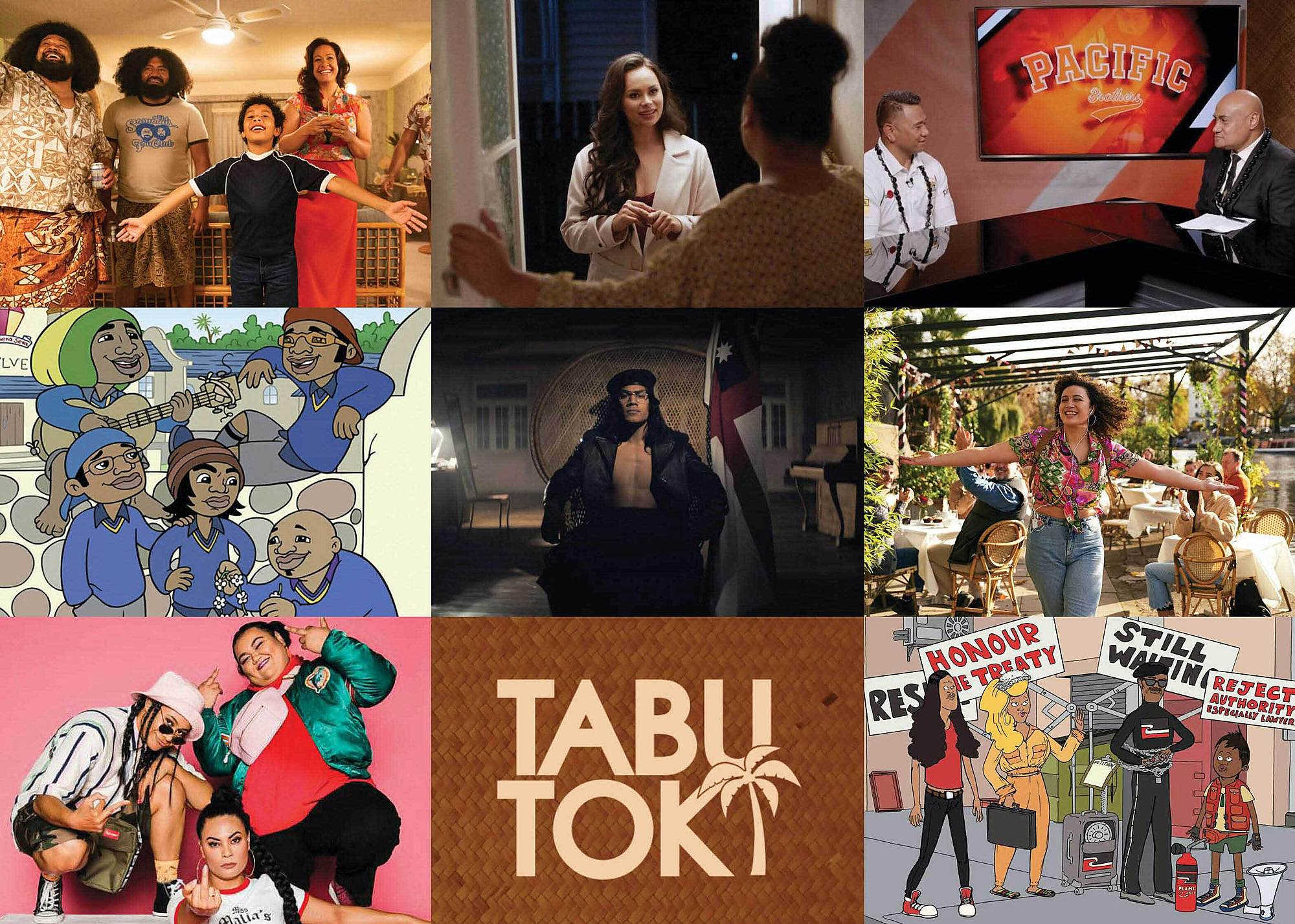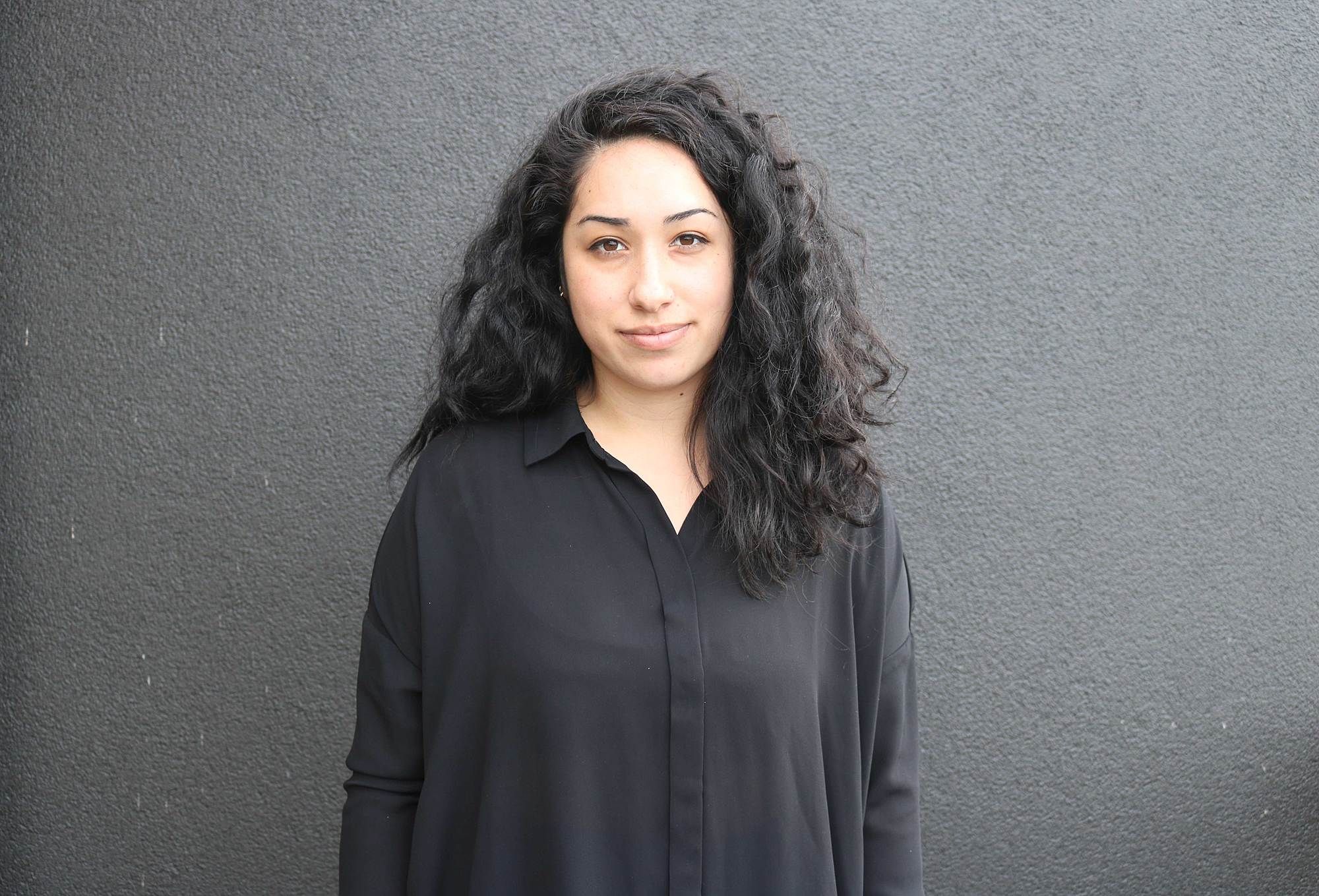Bingeing Brown
A serial binge watcher hungry for Pacific stories, Lana Lopesi reflects on its spike on TV and why she’s here for it.
There are two kinds of people in this world. Those that listen to music, and those that binge TV. While some people would choose to zone out to some good music and wine, I like to chill out by binge watching TV with a bag of chips. It has always been a big part of my life, more so than might seem appropriate, but encroaching on my 30s, it’s what gets me through.
Seeing Pacific faces on screen, however, has until very recently been a rare luxury. There were, of course, the Shortland Street ambulance drivers and nurses of my childhood (shout out to Nurse Donna Heka, played by Stephanie Tauevihi). And while Shortland Street did have Pacific writers around the table, like the formidable Victor Rodger, Pacific bodies were like chocolate chips speckled throughout the beige cookie of New Zealand TV.
Over the past year or so, though, it has felt like this has changed dramatically, with more Pacific faces on screen now and that only set to rise. Ahead of the release of The Panthers, a six-part historical fictional TV show on the story of the Polynesian Panthers, created by Tom Hern and Halaifonua Finau, I reflect on Pacific TV here in Aotearoa.
Pacific bodies were like chocolate chips speckled throughout the beige cookie of New Zealand TV.
I was 12 years old when bro’Town came out. It was a big deal.
I watched every episode of that first series during its 8–8.30pm time slot. Our family would watch it together, in the lounge around a non-flat-screen TV, cracking up. This, of course, was when you actually had to wait until something came on TV at its programmed time, an era long before streaming. At 12, I didn’t know what satire was or that people took offence at the show. So much so that apparently every episode in that first series received complaints. I just knew that I enjoyed it, that characters felt familiar in a way you maybe don’t want to admit, that a pair of brothers named Vale and Valea (dumb and dumber) made me laugh, and that it still has a kind of legendary place in Pacific television.
On a recent panel at the Auckland Writers Festival, I got the chance to ask Oscar Kightley, one of the creators behind the show, what he thought about the criticisms of bro’Town – that it perpetuates negative stereotypes of Pacific people. Pushing back on the criticism, he responded that he thinks it's more an issue of other people projecting negative perceptions onto the work. This push has made me think a lot about how in an environment starved of Pacific representation on screen, bro’Town, as a lone show of its time, unfairly held the burden of representation, having to defend itself against the politics of respectability. Cultural critic Mikki Kendall defines respectability politics as being “about controlling group behaviour with designations of appropriate and inappropriate behaviour.” Kendall continues, that they “push dominant narratives but don’t necessarily understand where their ideas of what is respectable come from.” They are also, according to Mikki, “an easy way to avoid engaging with history and current events.”
*
I was 19 when FreshTV came out.
Synopsis: Fresh is a popular TVNZ youth show with a focus on Pasifika arts, culture, events and sport. Since 2011 its “Poly-platter” of Pacific flavours has ranged from singer Ria Hall and sports star Sonny Bill Williams, to Game of Thrones actor Jason Momoa and hip hop choreographer Parris Goebel.
A Saturday morning time slot was difficult for a 19-year-old up to no good. Especially as this was in the hey-day of Hangar bar on a Friday night. But I remember the section of the show that profiled Pacific artists. Being in art school at the time, seeing our creative community featured on the show was eye-opening. Now, as a journalist, the archive that is FreshTV is an invaluable resource of the work of our Pacific people from the past 10 years.
When we think about Pacific current-affairs shows, the longstanding Tagata Pasifika is the beacon we all look to. But in the Covid-19 environment, Kava Bowl Media put together Pacific Brothers, now Pacific Brothers and Sisters, for the prime 8pm Wednesday-night slot on Sky Sports One. The show was dubbed the first Pacific primetime show in New Zealand television history, and used a talanoa-style approach to bring Pacific sports stories to national audiences.
Last week there was another show that launched, Tabu Tok. Using a talk-show-esque style, or more specifically the approach of tok stori, the show “unpacks and addresses the sometimes sensitive issues that Pacific peoples face.” Tabu Tok lives on its own online platform, with a new episode released every Sunday. How lucky are we?
*
Recently, when Rose Matafeo’s BBC One rom-com Starstruck was released, I pulled a segment from an old episode of FreshTV, in preparation for an interview with her.
Starstruck was the rom-com I didn’t know I was missing, receiving incredibly high praise in international media. It wasn’t until watching it that I realised how rare it is to see that Kiwi millennial sensibility in pursuit of love. It was perfectly Rose, and perfectly her comedic style, which couldn’t be any further from the Pacific comedy tropes of groups like the Laughing Sāmoans that we have come to be very familiar with. Rose having not really been claimed by the Pacific community before her big win at the Edinburgh awards, then suddenly becoming the first Sāmoan woman to win big, I asked her the question of what it means for your culture to claim you only once you’ve ‘made it’. She replied that it’s quite a strange thing for different people who don’t usually include you to suddenly start using you and your work in a way that makes sense to them and their ends. All I can say is, thank god they’re shooting a second season.
I, too, wanted to be the girlfriend of a movie star, although for me (along with many others) it was The Rock. Sāmoan actress Stacey Leilua did one better, though, and became his mum
And like the aspirations in Starstruck of a Kiwi gal living it up in London and falling in love with a movie star – I, too, wanted to be the girlfriend of a movie star, although for me (along with many others) it was The Rock. Sāmoan actress Stacey Leilua did one better, though, and became his mum, starring as Ata Johnson in the HBO series Young Rock.
Synopsis: A look at the formative years of superstar Dwayne 'The Rock' Johnson as he grows up through life.
Pacific comedy, like many Pacific spaces, has tended to be male dominated, until now. Undeniably, Rose is a huge part of that shift, with what she has self-described as “accidental feminism”. Of course, there was also the genius that was Aroha Bridge, created by Jessica Hansell aka Coco Solid. Made for Māori TV, the show is described as “An animated snapshot of the multicultural melting pot that is Aotearoa”, and is a life-line in so many ways. More recently, another TV show that is a part of this canon of wāhine comedic excellence is SIS, which had us all in a state of hyena laughs.
Synopsis: A group of writers must create a comedy show with their racist boss. Meanwhile, their sketches come to life. From STIs to body swaps, their characters master life one sketch at a time. A Polynesian sketch show about 'ride or die' friendships and growing up.
Brought to us by Hanelle Harris, the creative behind Baby Mama’s Club, SIS is triumphantly gorgeous. Not to detract from the show, but there was a tweet that went around asking if anyone else was “tired of this brown girl, hyena loud-mouth, dirty jokes hahaha narrative”. This commentary lingered around the show and reminded us again how ‘first’ shows of their kind constantly have to answer to the question of respectability. The tweeter continued that the representations she would rather see were empowered women as lawyers. Which begs the question, what's wrong with depicting the lives we actually have onscreen? Hyena laughs and all.
On the work of our wāhine, I was terrified when Teine Sā – The Ancient Ones came out.
I went through a period of watching too many horror films and now I can’t handle them. There’s that, but also teine sā aren’t fictional chracters; they’re as real as you and me. In my village, there’s a particular tree that bends a certain way. They say it’s the seat of the teine sā, and that when you drive past you better be quiet. Of course, when Teine Sā – The Ancient Ones was released I watched the premiere on Prime TV after dark. There’s something kind of emotional about seeing these stories on TV, but there’s also something really exciting about seeing Pacific television branch out beyond comedy and current affairs. There are always mixed feelings about making art out of our old stuff; my partner told me – they shouldn’t mess with that. I was all for it.
*
Representation is an important conversation, but for the gal who just wants to kick her heels up and watch some good Pacific TV, I can’t wait for us to be able to move on.
I grew up with an active imagination, imagining myself as TV and cartoon characters who couldn’t possibly be any different from me, because that’s just what you have to do when there's no one who looks like you. In 2012, a special episode of Tagata Pasifika that focused on Pacific actors celebrating 20 years of Shortland Street called largely for more Pacific representation on the screen. Comment was made that this will only happen when more Pacific people start writing for TV; and, you could also argue, when producers, networks and funders see value in the work.
When we talk about television and the lack of brown faces, we always end up talking about what happens when there is no representation. A story that feels so incredibly tired. Representation is an important conversation, but for the gal who just wants to kick her heels up and watch some good Pacific TV, I can’t wait for us to be able to move on. I think of Tina Makereti’s words in this context, where the solution is just more stories, all stories.

